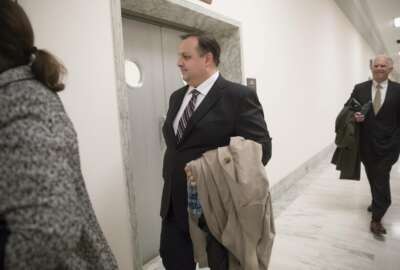

One potential proposal calls on Congress to require OGE to post more information online.
Walter Shaub might not be at the helm of the Office of Government Ethics, but he’s still steering a course for executive branch transparency.
Speaking at Wednesday’s congressional transparency caucus meeting, Shaub announced plans to present next week 13 legislative proposals to the House Committee on Oversight and Government Reform, aimed at increasing transparency while reducing the reporting burden on federal agencies.
“I’ve intentionally packaged them as sort of an a la carte menu, because I think each of them would result in some improvement,” Shaub said. “I don’t want to make it difficult for [lawmakers] by saying you have to accept all of them or it’s a catastrophe. I’m putting forth 13, because I believe in all 13, but if they decide that there’s one that they like and one they go forward with, then we’re that much better off than we are right now in my view.”
Shaub said the proposals aim to strike a middle ground, which was important so that people wouldn’t consider them partisan issues.
For example, one of the proposals would require the General Services Administration to post senior official travel reports more often than twice a year.
Shaub, who now works at the Campaign Legal Center as its senior ethics director, mentioned that when CLC requested GSA’s copies of senior official travel reports, the agency instructed the center to file individual Freedom of Information requests with the more than 130 federal agencies.
“This is a time to be looking for cost savings, and they’re there to be found with just the simple fix in the travel reports,” Shaub said.
It’s also a time to consider the workload some agencies have found themselves under as a result of increased interest in government oversight, ethics, and transparency.
“OGE was always very proud of its 100 percent on-time FOIA record,” Shaub said. “To be fair we only got about 20 FOIA requests a year, so it was easy to be a model student in the class. But we were a 70 person agency, so relative to that, 20 was a lot of work for us.”
As OGE grew more transparent and started releasing more information, Shaub said, it triggered more sophisticated FOIA requests, and those grew from 20 to 40 to 60 as of November 2016.
Shaub — and with him OGE — drew the spotlight even more last November, when he issued a series of tweets and made public comments on potential conflicts of interest related to President Donald Trump.
He said coming up on that one year mark, OGE has responded to about 500 requests, with potentially more that are still waiting a reply.
“That’s a pretty significant increase,” Shaub said.
Shaub shared on Wednesday that despite difficulties with the ethics program in the first year of the new administration, OGE was able to move more of President Donald Trump’s nominees through the ethics process faster in this presidential transition than President Barack Obama’s nominees.
“That’s an example of how the ethics program is really content neutral but really vital to holding together the fabric of our country, and transparency is so important because it’s the tool we need to use to gauge whether that’s working,” Shaub said.
Rep. Mike Quigley (D-Ill.), co-chair of the transparency caucus, said during the briefing that it’s hard to govern when there’s a lack of public trust.
“The most important and effective way to gain and regain the public’s trust is to be as transparent and accountable as possible,” he said.
Jennifer Ahearn, policy counsel for Citizens for Responsibility and Ethics in Washington (CREW), echoed similar sentiments, saying ethics issues point to the public’s trust in government, and also “impact the ability of every government official to make decisions that are both for the right reasons and also seem to be made for the right reasons in the public’s eye, that just couldn’t be more important to really the functioning of the entire government.”
Though Shaub declined to speak in too much detail about his 13 proposals, he shared that one of them would have Congress require OGE to post more information online. He also suggested lawmakers could clarify OGE’s authority to collect ethics information.
“This is sort of reinforcing the container that holds our representative form of government, and therefore is good for everybody,” Shaub said.
Shaub said the package builds on his message from this summer, which encourages giving OGE more leverage like a subpoena authority enforceable by a court, as well as legislative and budgetary authority.
Copyright © 2025 Federal News Network. All rights reserved. This website is not intended for users located within the European Economic Area.

